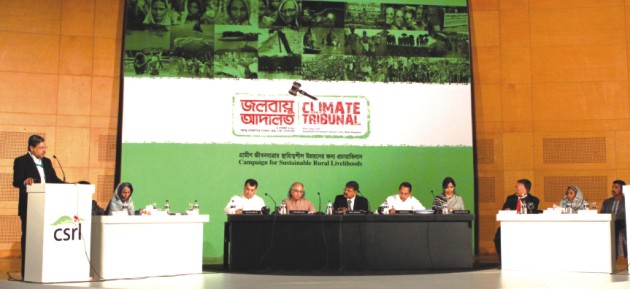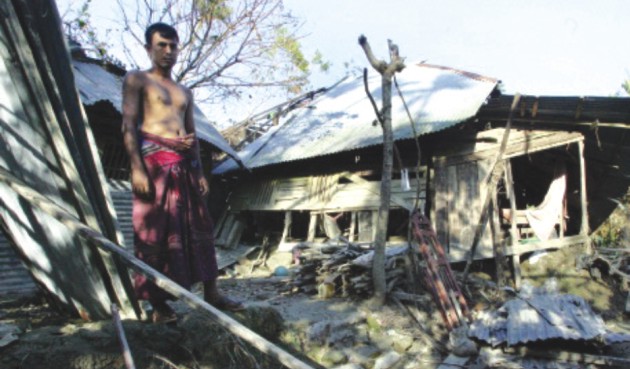“Until 2005, I used to earn in lakhs, I had 342 fishermen working for me; but everything changed when I went fishing with fourteen of my fishermen on a casual day that year. Suddenly, an emergency weather alert popped up and before we could make it to the shore, five- storey- high waves struck our boat and in no time we were holding on to a bamboo stick in the turbulent ocean, naked. We were rescued by another ship. But all was over for me; eight of my boats drowned that night and I was bankrupt… I have been fishing for twenty-four years but the ocean has never been this erratic. Emergency alerts were scarce in old days, So we could reach the land safely before any storm. Now, the storms are so frequent that it becomes impossible for us to sail back to the shore. The ocean is rapidly changing; the sea surface is getting hotter everyday; we barely have rain in the ocean now and even if it rains, the rainwater stings. We cannot even predict the tides now. A route that used to take one and a half hours, now takes twenty to twenty-five hours to sail through. I don't feel like going into an ocean so wild, but, I am cursed with it to make ends meet,”

Endless Mysery: Aftermath of all disasters. Photo: STAR FILE
Breaking into tears this was Bareq Dafadar's testimony as a victim of climate change at the “Mock Climate Tribunal” arranged by CSRL (Campaign for Sustainable Rural Livelihoods) on November 8, 2010.
The term “Climate Change”, in today's context, refers to the rapid changes in the earth's environment that are denouements of man-made exploitation. This change majorly consists of the aberrant increase in average temperature of the earth's atmosphere, which is triggered by the presence of excessive amount of greenhouse gases (GHG)-carbon dioxide, methane, nitrous oxide, CFC (chlorofluorocarbons) and ozone. Vestiges of climate change are abundant in Bangladesh- two decades ago the Bay of Bengal used to have only 4-5 low pressures during June to November; today this number has increased to 10-12; this year there have already been 15 emergency signals due to low pressure in the Bay of Bengal; from 1961 to 1998 the coastal temperature of Bangladesh increased .4-.5° C more than the normal increment which is alarming because surface temperature of the ocean is supposed to change at much slower rate due to some inherent nature of water. Technological lapses combined with socio-economic problems make Bangladesh one of the worst victims of climate change; and in this case Bangladesh is a sufferer of the mistakes made by others-the developed countries, the cardinal emitters of GHG. The mock climate tribunal was held to demonstrate the havoc of this neo-terrorism and bring forth the guilty party for expiation.
Dr Ahsan Uddin Ahmed, executive director of Centre for Global Change (CGC) who conducted the scientific analysis portion of the tribunal, explored the nooks and crannies of climate change and its gruesome upshots with The Star:
Bangladesh has faced natural calamities in the past and is facing them in present times. So why is climate change blamed for these disasters?
That's what the liable nations ask to avoid their responsibilities. Proving a direct relationship between the climate change and high-frequency natural disasters is indeed a next-to-impossible task. Climate change is a lengthy process. It takes thirty years of empirical statistics to prove any change in climate. That's why it is very difficult to say that the increased number of floods or low pressure above the ocean floor is a result of climate change. After 30 years we perhaps will be able to prove this relation but it will be too late then. Through rigorous research, we figured out a way to prove that the disasters we are observing, are directly related to global warming, i.e. climate change.
It is beyond doubt that low pressure and depression in the coastal region of Bangladesh have increased in the past decade. We can prove that the increased global temperature causes this.
Ocean water absorbs heat. But as it takes a lot of heat to increase the ocean's temperature even by 1° C, natural heat from the Sun does not cause any harm. Due to global warming, ocean water is absorbing excessive amount of heat. The overly heated water heats up the air above its surface. The hot air soars up creating a vacuum right above the ocean surface which results in “low pressure”, causing rain and storms in the ocean and in the coastal zone. The inflow of surrounding air to fill the vacuum sometimes turns into devastating cyclones. Now, the rain is supposed to cool the ocean surface and neutralise the effect of low pressure. But, due to global warming, the ocean surface is heated so severely that even rainwater cannot moderate it; as a result we face frequent low pressures. And everyone knows the reason behind global warming- emission of excessive amount of GHG.

Dr Ahmed, at the Mock Climate Tribunal.
Why are these “developed countries” blamed for climate change?
We don't need to blame the industrialised or First World countries for climate change. By signing the United Nations Framework Convention on Climate Change (UNFCCC), 39 developed nations of the world voluntarily accepted that by emitting the maximum portion of green house gasses, they are responsible for today's climate change. The Kyoto Protocol is a legal binding for all those nations who signed it (termed as Annex-1) to reduce the emission of green house gas. Statistically, before the signing of UNFCCC in 1992, 78% emission of GHG was caused by the Annex-1 countries.
The Annex-1 is responsible for climate change but why would they compensate for the victims of natural disasters in Bangladesh?
We are not asking for any compensation. Not all losses can be reimbursed. We are trying to show the Annex-1 that their irresponsible behaviour is costing us our lives. Effects of climate change vary in a vast range; you can find butterflies in some mountains in Nepal now, where life could not exist due to extreme cold even few years back. But this effect of climate change is not harming any human life directly. That's why we chose the victims of coastal calamities to show the direct consequences of climate change on human life. The floods, storms and cyclones have destroyed the lives of millions in Bangladesh. There are 20,000 fishermen of Bangladesh jailed in Orissa; they swam to foreign land to find sanctuary after being struck in storms during fishing. Families dependent on fishing are getting impoverished. This is the reason that school dropout rate is highest in the coastal areas of Bangladesh. Climate change is thus violating all the basic rights of our people. People who are causing this violation must stop causing that if not being punished for that.
Climate change is a global phenomenon. Why is Bangladesh more vulnerable to it than the countries, which are causing this change?
First of all, others unfairly imposed this phenomenon on us; we are paying for damages made by “others”. We are technologically light-years behind the developed nations. Our fishermen do not use high-tech fishing boats; it takes days for them to go to a fishing spot and come back from there. If they are caught in a storm during this time, they have no technology to call for help or save them. Due to the increased frequency of low pressure, fishermen often have to abort their voyages half way. This cripples them financially because it takes a lot of money and preparation to go into the ocean for fishing. Moreover, Bangladesh is a low-lying country, so it's naturally more vulnerable to the rising sea-level.
The responsible countries signed the Kyoto Protocol, what are we dreading now?
The major feature of the Kyoto Protocol is that it sets binding targets for 37 industrialised countries and the European community for reducing GHG emissions. These amount to an average of five per cent against 1990 levels over the five-year period, 2008-2012. The US did not even sign the protocol and none of the committing countries reduced their emission; only Netherlands have not increased emission, which is better than what others are doing. So, the developed countries are breaching their commitment continuously and nobody is doing anything about it. It is majorly because there is no international body to accuse and punish this kind of “crime”. And that's what we are dreading.
GHG emission is a byproduct of industrialisation. Unless the developed countries find an alternate power source, isn't it impossible for them to reduce emission?
Emission cannot be defined in terms of indutrialisation. It is more related to the livelihood, consumption behaviour and choices of the masses. In the West, every family is using one car per member, imagine the amount of carbon emission. Dutch people have reduced this emission by using one car per family and by using bicycles and public transport as the major means of transportation; if they can do it, why can't the others? The technology choices also play a major factor. Instead of using power-consuming technologies, people can turn to power-saving ones; because burning fuel, which is a major emitter of GHG, produces this “power”.

Scapegoat of Nature’s Fury. Photo: STAR FILE
I would rather blame the Governments of those countries for emissions than the industrialists. The job of an industrialist is to make profits. But the Government does not have any policy that insures that the industrialist will make the same profit if s/he uses environmentally friendly technologies and processes.
Sometimes the dense population of the developing countries is blamed for global warming but it's nothing but a myth. If Bangladesh completely stops any and every emission of GHG, it will not make any difference in the global per capita emission, whereas if the New York City stops it, the reduction will be dramatic.
Is there any hope for us then?
Well, the fact is, the developed nations will face the consequences of climate change in the future. They are not doing anything about it right now because they are facing no immediate effects. I guess they are waiting for that magic technology which will keep their industrial growth high and steady and yet emit less. Unfortunately, the scenario is not same for us. If nothing is done immediately, the game will soon be over for us.
The silver lining that I see is, during the Copenhagen climate conference, one lakh people came out on the streets when it was -13° C, to protest against the reckless attitude of the world leaders. Let's say all 24 thousand delegates of the conference from nations like ours were there in the protest; still 76 thousand of the protesters were “their” people- privileged consumers of industrialisation.
Before 2007, Australia did not ratify the Kyoto protocol. The party that won the election that year had “Climate Change” as one of their pivotal agenda. Later, in the Bali Climate Conference, Australia ratified the Kyoto Protocol.
Public awareness has started to grow, mass people are realising the ghastly consequences of climate change. Fortunately, it has always been the mass that has prevailed. Kingdoms have been destroyed, governments have fallen, and rebels have been subdued but no one has ever been able to suppress the general public. If the youth once realise that they won't repeat their parents' mistakes, we can hope for a better future for ourselves.
